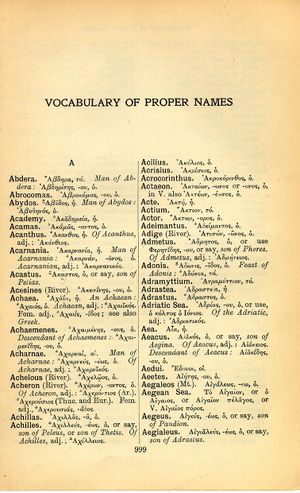Adrastea: Difference between revisions
From LSJ
Ἴσος ἴσθι πᾶσι, κἂν ὑπερέχῃς τῷ βίῳ → Quamvis superior sorte, da te aequum omnibus → Sei allen gleich, auch wenn du reicher bist
(D_1) |
(Gf-D_1) |
||
| Line 1: | Line 1: | ||
{{WoodhouseENELnames | {{WoodhouseENELnames | ||
|Text=[[File:woodhouse_999.jpg|thumb|link= | |Text=[[File:woodhouse_999.jpg|thumb | ||
|link={{filepath:woodhouse_999.jpg}}]]Ἀδραστεία, ἡ. | |||
}} | }} | ||
{{Lewis | {{Lewis | ||
Revision as of 07:21, 14 August 2017
English > Greek (Woodhouse)
Ἀδραστεία, ἡ.
Latin > English (Lewis & Short)
Ā̆drastēa: or Ā̆drastīa, ae, f., = Ἀδράστεια.
I The daughter of Jupiter and Necessity (so called from an altar erected to her by Adrastus), the goddess who rewards men for their deeds, and who esp. punishes pride and arrogance: quod nec sinit Adrastea, Verg. Cir. 239: ineffugibilis, App. de Mund. p. 75; Amm. 14, 11.—
II A city of Mysia, later called Parium, Plin. 5, 32, 40, § 141; Just. 11, 6, 10.
Latin > French (Gaffiot 2016)
Adrastēa (-tīa), æ, f. (Ἀδράστεια), surnom de Némésis : Amm. 14, 11, 25 ; 22, 3, 12.

